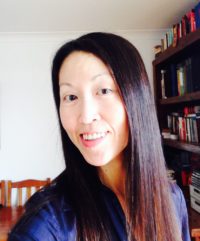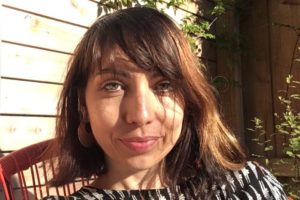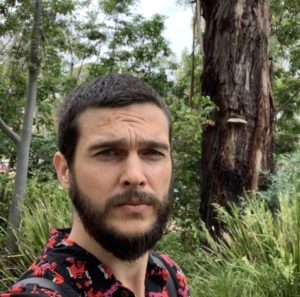Announcing the 2021 Mascara Bundanon Writer’s Residency Winner
We’re thrilled to announce that the winner for the 2021 Mascara Bundanon Writer’s Residency is
Isabelle Li
 Isabelle Li is a Chinese Australian writer and translator. She has published in various anthologies and literary journals in Australia including The Best Australian Stories, Southerly, Westerly and UTS Writers’ Anthology. Her collection of short stories A Chinese Affair was published by Margaret River Press in 2016. Her prose translations have appeared in Sydney Review of Books and her poetry translations in Mascara, World Literature and Works. Her Chinese translation of Sebastian Barry’s novel The Secret Scripture is published by Zhejiang Literature; Art Publishing House. Isabelle is currently studying her Doctor of Creative Arts at Western Sydney University.
Isabelle Li is a Chinese Australian writer and translator. She has published in various anthologies and literary journals in Australia including The Best Australian Stories, Southerly, Westerly and UTS Writers’ Anthology. Her collection of short stories A Chinese Affair was published by Margaret River Press in 2016. Her prose translations have appeared in Sydney Review of Books and her poetry translations in Mascara, World Literature and Works. Her Chinese translation of Sebastian Barry’s novel The Secret Scripture is published by Zhejiang Literature; Art Publishing House. Isabelle is currently studying her Doctor of Creative Arts at Western Sydney University.
JUDGE’S COMMENTS
Isabelle Li’s ‘The Northern Tomb’ is exciting, engaging, and very promising. It employs a smooth narrative voice, suffused with telling details and implications of character; a facility for drawing the way characters gently push and pull against each other. There are many clever, artful details about the narrator, her son Dawei, and Mr Zhao. It is confidently handled. There are also clever hints throughout about the cultural setting and details of contemporary life. Li shows a deft touch and subtle hand for the telling detail. Straightforward and raw, it inscribes real and personal experiences in Australia and provincial China, replete with their violence and personal destitution. The emotional leaps are handled well through stoicism and resignation. Her writing is a mature example of the trans-migration of the imagination and its understated translation into melancholia and dislocation.
We thank our 2021 judges: DECLAN FRY and BRIAN CASTRO
A few words from Mascara
“The applications we received speak to the sheer talent, voice and diversity of stories, essays, mixed media and poems in our cohorts. We were thrilled with the response, the vividness and creative lifeblood infusing the projects.”
About
In partnership with the Bundanon Trust, the inaugural Mascara Bundanon Writer’s residency is an exciting opportunity for an emerging or established First Nations or CaLD writer with an innovative project that pushes their writing craft into new expressive and conceptual territory. We received applications in poetry, fiction, non-fiction, graphic fiction. The winner receives a two week residency at Bundanon, a stipend of $1,000 and a manuscript reading to be arranged with Ultimo Press. A chance to immerse in the layered landscape and history of Bundanon, a place of renewal, where new relationships to country, history and creative practices are formed. We thank the Wodi Wodi and Yuin people for their care of and connection to land, culture and community.
SHORTLIST
Timmah Ball
 Timmah Ball is a non-fiction writer, researcher and creative practitioner of Ballardong Noongar heritage whose practice is influenced by a short career in urban planning. Her writing has appeared in a range of anthologies and literary magazines such as The Sydney Review of Books, Meanjin, The Griffith Review and Columbia University’s The Avery Review. In 2016 she won the Westerly Patricia Hackett Prize and is currently an Arts House Makeshift Publics artist in resident and editor of First Nations writing for The Westerly Magazine.
Timmah Ball is a non-fiction writer, researcher and creative practitioner of Ballardong Noongar heritage whose practice is influenced by a short career in urban planning. Her writing has appeared in a range of anthologies and literary magazines such as The Sydney Review of Books, Meanjin, The Griffith Review and Columbia University’s The Avery Review. In 2016 she won the Westerly Patricia Hackett Prize and is currently an Arts House Makeshift Publics artist in resident and editor of First Nations writing for The Westerly Magazine.
JUDGE’S COMMENTS
Timmah Ball’s Blue Print for Another World is remarkable for its melancholic tone and questions the power of conceiving design and planning to refigure Australia as ‘a multifaceted continent whose unique and divergent cultures make up a complex ecosystem rather than the western construct of states border, regions and capital cities.’ It is marked by its searching, frank assessments of self and place and the contradictions of reflecting on change within the luxuries of capitalism: ‘in the cycle of deep discussion we only ever brush the edge of change.’ This is a work of ficto-criticism and it cleverly reconstructs a map viewed from a complex First Nations ecosystem. Her writing is richly engaged, revealing a strong social commitment to the connection between poetics and cartography, between language and country.
Luke Patterson
 Luke Patterson is a Gamilaroi poet and folklorist living on Gadigal lands. He is interested in the ways bioregional identities and consciousness are expressed through localised and vernacular forms. Luke’s research and creative pursuits are grounded in his extensive work with Aboriginal and other community-based organizations across Australia.
Luke Patterson is a Gamilaroi poet and folklorist living on Gadigal lands. He is interested in the ways bioregional identities and consciousness are expressed through localised and vernacular forms. Luke’s research and creative pursuits are grounded in his extensive work with Aboriginal and other community-based organizations across Australia.
JUDGE’S COMMENTS
TEK expands on the “Authority” and constitutes a poetic and methodological experiment that plays on the anthropologically derived term “traditional ecological knowledge”. Patterson’s poetry is muscular and sinuous. Its interlaced rhyme patterns and use of assonance and slant rhyme are notable, providing music and movement to the verse. He has a great command of language and his commitment to ecology and the environment is unquestionable since he combines this with knowledge and history. The cadences and rhythms of his work are outstanding: city and country; capitalism and indigeneity; climate and chaos.
Saba Vasefi
 Saba Vasefi’s personal lived experience as a refugee and exiled feminist poet and writer together gives her unique experience and insight. Since seeking asylum in Australia and started to write in English, I have been focused on completing my PhD and fulfilling my journalistic work. For four years, she was director of Sydney International Poetry and Arts Festival, and two years director of Diaspora symposium. Recent Work Press has published her current project the Borderless, A Transnational Anthology of Feminist Poetry.
Saba Vasefi’s personal lived experience as a refugee and exiled feminist poet and writer together gives her unique experience and insight. Since seeking asylum in Australia and started to write in English, I have been focused on completing my PhD and fulfilling my journalistic work. For four years, she was director of Sydney International Poetry and Arts Festival, and two years director of Diaspora symposium. Recent Work Press has published her current project the Borderless, A Transnational Anthology of Feminist Poetry.
JUDGE’S COMMENTS
Saba Vasefi’s poetry is dramatic and lyrical. There is a conflation of poetry and autobiography, which gives her work a frankness that is limpid and clear-sighted. Saba Vasefi’s poetry is notable for the contrasts it draws between the mundane and violent: ‘No matter how many holy verses / they made my mouth express, / no prayers found their God.’ A highlight is ‘The Forbidden Gender’ which begins with a contrast between its quotidian details and the shock of the last line: ‘The road had potholes, / the school had veils, / and the students / lay dead under their burqas in a well.’ It includes perhaps one of the best couplets in the collection: ‘Instead, we were free / to die as much as we desired …’